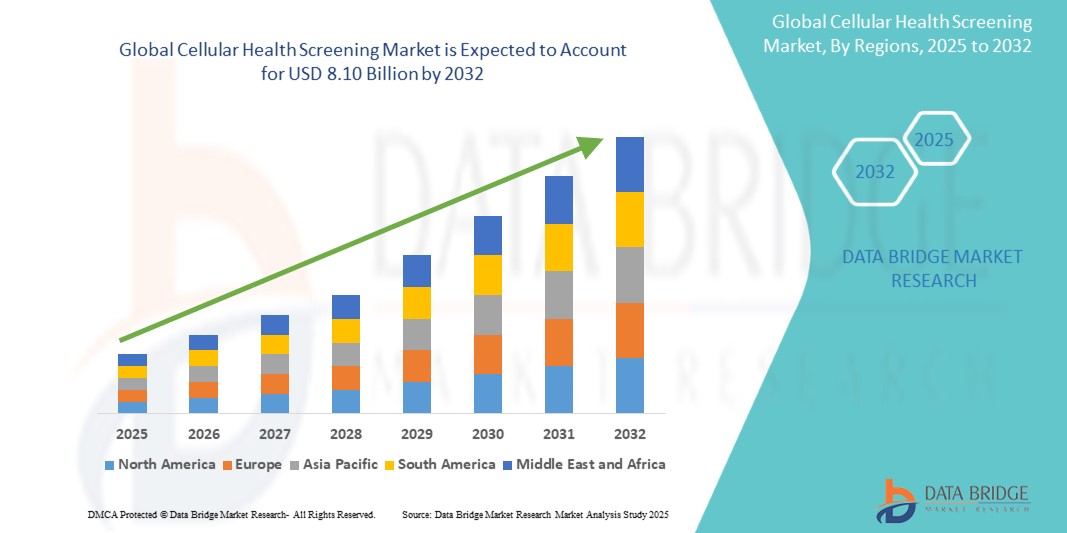
The cellular health screening market focuses on innovative technologies that analyze cellular function and identify potential health risks at the cellular level. This proactive approach to healthcare aims to detect early signs of disease, enabling personalized prevention and intervention strategies.
Market Size
The global cellular health screening market is currently in its early stages of growth. While precise market size figures vary depending on the sources and methodologies used, it is estimated to be a multi-billion dollar market with significant growth potential.
For more information, visit https://www.databridgemarketresearch.com/reports/global-cellular-health-screening-market
Market Share
- Technology-Based Segmentation:
- Technologies such as gene expression profiling, proteomics analysis, metabolomics analysis, and epigenetic analysis hold significant market shares.
- Emerging technologies like single-cell analysis and liquid biopsies are gaining traction and are expected to capture a larger market share in the future.
- Application-Based Segmentation:
- Applications in oncology, neurodegenerative diseases, cardiovascular diseases, and infectious diseases currently dominate the market share.
- Expanding applications in personalized medicine, drug discovery, and regenerative medicine are expected to drive future market growth.
- Key Players:
- Leading players in the market include Illumina, Thermo Fisher Scientific, Agilent Technologies, Danaher, and Roche Diagnostics. These companies hold significant market shares due to their strong technological expertise, extensive product portfolios, and global reach.
Market Opportunities
The cellular health screening market presents several promising opportunities:
- Early Disease Detection: Early detection of diseases like cancer, Alzheimer's, and cardiovascular diseases through cellular analysis can significantly improve treatment outcomes and potentially reduce mortality rates.
- Personalized Medicine: Cellular health screening enables personalized medicine by identifying individual risk factors and tailoring treatment plans accordingly.
- Drug Discovery and Development: Cellular analysis can accelerate drug discovery and development by providing valuable insights into disease mechanisms and identifying potential drug targets.
- Aging and Longevity: Cellular health screening can play a crucial role in understanding the aging process and developing interventions to promote healthy aging and longevity.
- Precision Prevention: By identifying individuals at high risk of developing certain diseases, proactive interventions can be implemented to prevent or delay disease onset.
Market Challenges
The cellular health screening market also faces several challenges:
- Technological Limitations: Current technologies may have limitations in terms of sensitivity, specificity, and cost-effectiveness.
- Data Interpretation and Analysis: Analyzing and interpreting complex cellular data requires sophisticated bioinformatics tools and expertise.
- Regulatory Hurdles: The development and implementation of new cellular health screening technologies may face regulatory hurdles.
- Ethical Considerations: Concerns related to data privacy, genetic discrimination, and equitable access to these technologies need to be carefully addressed.
- Market Adoption: Widespread adoption of cellular health screening technologies may require significant public education and awareness campaigns.
Market Demand
Demand for cellular health screening is driven by several factors:
- Growing Awareness: Increasing public awareness about the importance of early disease detection and personalized medicine.
- Technological Advancements: Continuous advancements in technologies like genomics, proteomics, and metabolomics are driving innovation in cellular health screening.
- Aging Population: The aging global population increases the demand for technologies that can assess health risks and monitor age-related diseases.
- Rise of Chronic Diseases: The increasing prevalence of chronic diseases such as cancer, diabetes, and heart disease is driving the need for early detection and intervention strategies.
- Healthcare Cost Containment: Cellular health screening can potentially help to reduce healthcare costs by enabling early intervention and preventing costly complications.
Market Trends
Several key trends are shaping the cellular health screening market:
- Integration of Artificial Intelligence (AI) and Machine Learning (ML): AI and ML algorithms are being increasingly used to analyze complex cellular data, improve diagnostic accuracy, and identify predictive biomarkers.
- Liquid Biopsies: Liquid biopsies, which involve analyzing circulating biomarkers in blood or other bodily fluids, are gaining popularity due to their minimally invasive nature.
- Single-Cell Analysis: Technologies that analyze individual cells are providing unprecedented insights into cellular heterogeneity and disease mechanisms.
- Point-of-Care Diagnostics: The development of point-of-care diagnostic devices for cellular health screening is enabling rapid and convenient testing.
- Telemedicine and Remote Monitoring: Telemedicine platforms are being integrated with cellular health screening technologies to enable remote patient monitoring and improve access to care.
In conclusion, the cellular health screening market holds immense potential to revolutionize healthcare by enabling early disease detection, personalized medicine, and improved health outcomes. While challenges remain, ongoing research and development, coupled with advancements in technology and increasing market adoption, are expected to drive significant growth in this promising field.

0 Comments
Post Comment